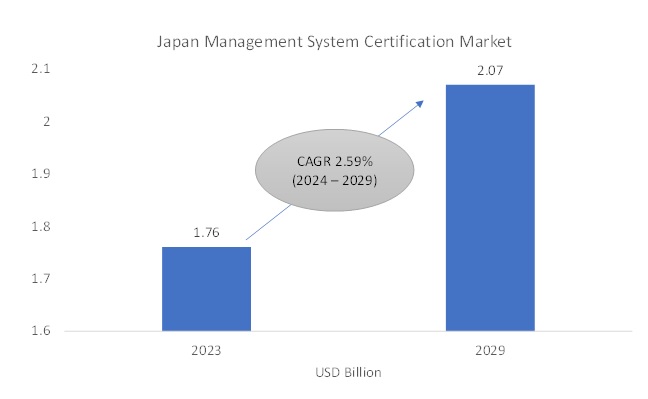Japan Management System Certification Market Growth Projected to Reach USD 2.07 Billion by 2029
According to MarketsandMarkets, the Japan Management System Certification market is projected to grow from USD 1.76 billion in 2023 to reach USD 2.07 billion by 2029; it is expected to grow at a CAGR of 2.59% from 2024 to 2029.

Overview of Japan’s Management System Certification Market
Japan is a global leader in industries like electronics, automotive, aerospace, and advanced manufacturing, where management system certifications (MSCs) play a critical role. MSCs ensure that companies meet stringent quality, safety, and environmental standards, allowing them to compete effectively in international markets. Certifications such as ISO 9001 for quality management, ISO 14001 for environmental management, and ISO 45001 for occupational health and safety are widely adopted across Japan’s industrial landscape. These certifications also help Japanese companies align with global trade requirements and attract foreign direct investment (FDI), reinforcing the country’s position in the global economy.
Factors Driving Market Demand
-
Adoption of Advanced Technologies: Japan’s commitment to technological innovation has significantly increased the demand for MSCs. With industries like IT, telecommunications, and manufacturing integrating technologies such as 5G, IoT, and artificial intelligence, there is a pressing need for certifications to ensure system reliability, data security, and interoperability. These certifications are essential for meeting international standards and fostering trust among stakeholders in rapidly digitizing sectors.
-
Focus on Sustainability and Green Initiatives: Sustainability is a significant priority for Japan, driven by government policies to reduce carbon emissions and transition to renewable energy. Programs like the Green Growth Strategy have pushed industries to adopt environmentally friendly practices, creating a growing demand for certifications such as ISO 14001 (environmental management) and ISO 50001 (energy management). These certifications help industries align with global environmental standards while enhancing their competitiveness in international markets.
- Growth in the Automotive Sector: The automotive industry in Japan, home to prominent brands like Toyota and Honda, has increasingly relied on management system certifications as it transitions to electric and autonomous vehicles. Certifications for safety, quality, and environmental impact are essential as the industry adapts to evolving international regulations and consumer preferences. Government incentives promoting the use of electric vehicles (EVs) and alternative energy sources like hydrogen fuel cells further drive the demand for certifications that ensure compliance with global standards.
Laws and Regulations Impacting the Management System Certification Market
Japan’s regulatory framework is closely aligned with global standards, ensuring the country’s industries remain competitive on an international level. The Industrial Standardization Act mandates compliance with the Japan Industrial Standards (JIS), which are frequently updated to match international benchmarks such as ISO certifications. Specific laws, like the Act on the Rational Use of Energy, require companies to adopt certifications to meet energy efficiency targets. Similarly, the Basic Environment Law ensures businesses follow stringent environmental guidelines, creating a robust demand for related certifications. Additionally, trade agreements like the Comprehensive and Progressive Agreement for Trans-Pacific Partnership (CPTPP) necessitate adherence to uniform certification standards for participating nations, further boosting demand for management system certifications in Japan.
Impact of Generative AI on the Management System Certification Market
Generative AI (Gen AI) is revolutionizing Japan’s management system certification sector by automating complex tasks, improving the accuracy of certification processes, and reducing operational costs. AI-driven tools are increasingly used to analyse compliance data, identify areas for improvement, and recommend corrective measures. This enables faster and more efficient certification processes, particularly beneficial in sectors like IT and manufacturing. Additionally, AI technologies are being integrated into product testing, allowing for advanced simulations that ensure adherence to certification standards. However, the widespread use of AI also raises concerns regarding data privacy and ethical challenges in decision-making, emphasizing the need for new regulatory frameworks to manage these risks.
Challenges in the Japanese Management System Certification Market
Despite its robust framework, Japan’s management system certification market faces several challenges. The high costs associated with obtaining and maintaining certifications can discourage small and medium-sized enterprises (SMEs) from fully adopting them, limiting their access to global markets. Additionally, Japan’s aging workforce poses long-term concerns for the availability of skilled professionals to manage and innovate within the certification industry. The reliance on an aging population also impacts industries reliant on management system certifications, such as manufacturing and healthcare. Geopolitical tensions, particularly with major trading partners, add uncertainty to supply chains, potentially disrupting industries that depend heavily on certifications. Moreover, as global standards evolve rapidly, companies must continuously update their systems and invest in new technologies, which can be resource-intensive and particularly burdensome for smaller organizations.
Related Reports:
Management System Certification Market by Certification Type (Product and Management System Certification), Service Type (Certification & Verification and Training & Business Assurance), Application, Vertical and Region - Global Forecast to 2029
Contact:
Mr. Rohan Salgarkar
MarketsandMarkets Inc.
1615 South Congress Ave.
Suite 103,
Delray Beach, FL 33445
USA : 1-888-600-6441
sales@marketsandmarkets.com
This FREE sample includes market data points, ranging from trend analyses to market estimates & forecasts. See for yourself.
SEND ME A FREE SAMPLE





